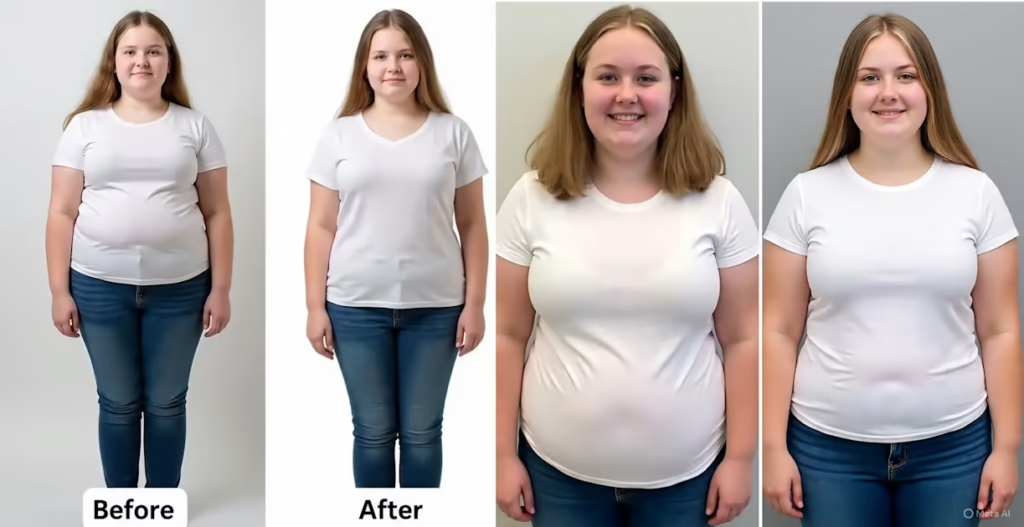We’ve all been there. You’re feeling great about your weight loss journey, your clothes are fitting better, and your energy levels are soaring. But when you look in the mirror, you might still see a fuller face than you’d like. Losing weight in the face can be a particularly frustrating area, as it often feels resistant to our efforts. However, the good news is that while you can’t target fat loss in a specific area, adopting a holistic approach that combines healthy lifestyle changes can significantly contribute to a slimmer, more defined facial appearance.
This in-depth guide will delve into the various strategies you can implement to help reduce facial fat, addressing everything from diet and exercise to lifestyle adjustments and targeted facial exercises. Remember, consistency is key, and while results may vary from person to person, embracing these healthy habits will not only benefit your face but also your overall well-being.
Understanding Why We Gain Fat in Our Face
Before we dive into the solutions, it’s important to understand why excess fat accumulates in the face in the first place. Several factors contribute to facial fullness:

- Overall Body Fat: The most common reason for a round or full face is simply having a higher percentage of overall body fat. When you gain weight, fat cells accumulate throughout your body, including your face and neck. This is often the primary culprit and the most significant factor to address.
- Water Retention (Bloating): Sometimes, a puffy face isn’t due to fat but rather to fluid retention. High sodium intake, dehydration, hormonal changes, allergies, and certain medical conditions can all lead to water retention in the face, making it appear fuller and more swollen.
- Genetics: Our genes play a significant role in determining where our bodies store fat. Some people are genetically predisposed to carry more fat in their facial region. While you can’t change your genetics, you can still influence the amount of fat you carry overall.
- Poor Diet: A diet high in processed foods, sugary drinks, unhealthy fats, and excessive sodium can contribute to both overall weight gain and water retention, impacting facial appearance.
- Lack of Exercise: A sedentary lifestyle can lead to weight gain, increasing the likelihood of fat accumulation in all areas of the body, including the face.
- Alcohol Consumption: Alcohol can cause dehydration and inflammation, both of which can contribute to facial puffiness and a flushed appearance.
- Lack of Sleep: Insufficient sleep can disrupt hormone balance, potentially leading to increased cortisol levels, which can contribute to weight gain and fluid retention.
- Stress: Chronic stress can also elevate cortisol levels, having similar effects to a lack of sleep on weight and fluid balance.
The Power of Overall Weight Loss
The most effective way to lose fat in your face is to focus on reducing your overall body fat percentage. When you lose weight, your body doesn’t discriminate where the fat comes from; it’s a systemic process. As you shed those extra pounds, you’ll likely notice a reduction in fat throughout your body, including your face.
Here’s how to approach overall weight loss effectively:
1. Prioritize a Healthy, Balanced Diet:
Your diet is the cornerstone of any successful weight loss journey. Focus on consuming whole, unprocessed foods that are nutrient-dense and lower in calories.

- Increase Your Intake of Fruits and Vegetables: These are packed with vitamins, minerals, and fiber, which help you feel full and satisfied while being low in calories.
- Choose Lean Proteins: Opt for sources like chicken breast, fish, beans, lentils, and tofu. Protein helps preserve muscle mass during weight loss and promotes satiety.
- Select Whole Grains: Replace refined grains (like white bread and pasta) with whole grains (like brown rice, quinoa, and oats). They are higher in fiber and have a more gradual impact on blood sugar levels.
- Healthy Fats in Moderation: Include sources of healthy fats like avocados, nuts, seeds, and olive oil. These are beneficial for overall health but should be consumed in moderation due to their calorie density.
- Limit Processed Foods, Sugary Drinks, and Unhealthy Fats: These are often high in empty calories, sodium, and unhealthy fats that contribute to weight gain and water retention. Cutting back on these will make a significant difference.
2. Embrace Regular Physical Activity:
Exercise is crucial for burning calories, boosting your metabolism, and improving your overall health. Aim for a combination of cardiovascular exercises and strength training.

- Cardiovascular Exercises (Cardio): Activities like running, cycling, swimming, brisk walking, and dancing are excellent for burning calories and reducing overall body fat. Aim for at least 150 minutes of moderate-intensity or 75 minutes of vigorous-intensity aerobic activity per week. High-Intensity Interval Training (HIIT) can also be very effective for fat burning in a shorter amount of time.
- Strength Training: Incorporating strength training exercises (using weights, resistance bands, or your own body weight) helps build muscle mass. Muscle tissue burns more calories at rest than fat tissue, which can aid in long-term weight management. Aim for strength training exercises that work all major muscle groups at least two days per week.
3. Stay Hydrated:
Drinking enough water is essential for overall health and can also play a role in reducing facial puffiness caused by water retention. When you’re dehydrated, your body may hold onto water to compensate. Staying well-hydrated signals to your body that it doesn’t need to retain excess fluid. Aim for at least 8 glasses of water per day, and even more if you’re active or in hot weather.
Targeting Facial Appearance: Beyond Overall Weight Loss
While overall weight loss is the primary driver of facial fat reduction, certain strategies can complement your efforts and help to further sculpt your facial features.
1. Watch Your Sodium Intake:
High sodium intake is a major culprit behind water retention, which can lead to a puffy face. Be mindful of the sodium content in processed foods, sauces, and restaurant meals. Opt for fresh, whole foods and season your meals with herbs and spices instead of excessive salt.
2. Limit Alcohol Consumption:
Alcohol can dehydrate you and cause inflammation, both of which can contribute to facial bloating. Moderate your alcohol intake to minimize these effects.
3. Get Sufficient Sleep:
Aim for 7-9 hours of quality sleep each night. Poor sleep can disrupt hormones that regulate appetite and metabolism, potentially leading to weight gain and fluid retention.
4. Manage Stress Levels:
Chronic stress can lead to elevated cortisol levels, which can contribute to weight gain and fluid retention. Practice stress-reducing techniques like yoga, meditation, deep breathing exercises, or spending time on hobbies you enjoy.
5. Consider Facial Exercises (Though Evidence is Limited):
While scientific evidence supporting the effectiveness of facial exercises for fat loss is limited, some people find them helpful for toning facial muscles, which can potentially contribute to a more defined appearance. Examples of facial exercises include:
- Cheek Puffs: Fill your mouth with air like a balloon and hold for a few seconds. Then, move the air from one cheek to the other.
- Fish Face: Suck in your cheeks and lips, creating a “fish face.” Hold for a few seconds and repeat.
- Chin Lift: Tilt your head back and look at the ceiling. Pucker your lips as if you’re trying to kiss the ceiling, stretching the muscles under your chin.
- Jawline Toner: Open your mouth wide and then slowly move your lower jaw forward and backward. Then, move it side to side.
- Smiling Exercise: Smile as wide as you can while clenching your teeth. Hold for a few seconds and relax.
Remember that while these exercises might help tone muscles, they are unlikely to significantly reduce fat deposits in the face.
6. Be Mindful of Your Posture:
Believe it or not, your posture can influence the appearance of your face and neck. Slouching can contribute to a double chin. Maintain good posture by keeping your back straight, shoulders relaxed, and head level.
7. Consider Facial Massage and Cold Therapy:
Gentle facial massage can help improve blood circulation and lymphatic drainage, potentially reducing puffiness. Applying a cold compress or using a cold roller on your face can also temporarily tighten the skin and reduce swelling.
8. Rule Out Medical Conditions and Allergies:
If you experience sudden or persistent facial swelling, it’s essential to consult a doctor to rule out any underlying medical conditions or allergies that could be contributing to the issue.
Patience and Consistency are Key
Losing weight in your face, just like losing weight in any other part of your body, takes time and dedication. Don’t get discouraged if you don’t see results immediately. Be patient with the process, stay consistent with your healthy habits, and celebrate small victories along the way. Remember that a healthy lifestyle has numerous benefits beyond just your facial appearance.
Frequently Asked Questions (FAQ):
Q: Can I target fat loss specifically in my face?
A: While you can’t specifically target fat loss in one area, losing overall body fat will naturally lead to fat reduction in your face as well.
Q: How long does it take to lose weight in your face?
A: The timeline varies depending on individual factors like metabolism, overall body fat percentage, and consistency with lifestyle changes. Some people may see results within a few weeks, while for others it might take longer.
Q: Are facial exercises effective for losing face fat?
A: The evidence supporting facial exercises for fat loss is limited. However, they may help tone facial muscles, potentially contributing to a more defined appearance.
Q: What is the best diet for losing fat in my face?
A: A balanced diet focused on whole, unprocessed foods, lean proteins, fruits, vegetables, and whole grains, while limiting processed foods, sugary drinks, and unhealthy fats, is ideal for overall weight loss, which will impact facial fat.
Q: Can water retention make my face look fat?
A: Yes, water retention (bloating) can cause your face to appear fuller and more swollen. Reducing sodium intake, staying hydrated, and getting enough sleep can help minimize water retention.
Q: Should I avoid certain foods to lose face fat?
A: Limiting processed foods, sugary drinks, high-sodium foods, and excessive alcohol can help reduce both overall body fat and water retention, contributing to a slimmer face.
Q: Can stress affect my facial appearance?
A: Yes, chronic stress can elevate cortisol levels, which may lead to weight gain and fluid retention, potentially affecting your facial appearance.
Q: Are there any non-surgical procedures to reduce face fat?
A: Yes, there are non-surgical cosmetic procedures like facial fillers (to create contours), Kybella injections (to dissolve fat under the chin), and radiofrequency treatments (for skin tightening) that can impact facial appearance. However, these should be discussed with a qualified medical professional.
Q: When should I consult a doctor about facial swelling?
A: If you experience sudden or persistent facial swelling, especially if accompanied by other symptoms, it’s important to consult a doctor to rule out any underlying medical conditions or allergies.
Q: What are some quick tips for a less puffy face?
A: Staying hydrated, reducing sodium intake, getting enough sleep, applying a cold compress, and gently massaging your face can help reduce temporary facial puffiness.
Disclaimer:
The information provided in this article is intended for general knowledge and informational purposes only, and does not constitute medical advice. It is essential to consult with a qualified healthcare professional or a registered dietitian for personalized advice regarding weight loss and health concerns. Individual results may vary, and there are no guarantees of specific outcomes. The effectiveness of certain strategies mentioned, such as facial exercises, may have limited scientific evidence. Always prioritize a balanced and sustainable approach to weight management and overall health. If you have any underlying health conditions or concerns, please seek guidance from a healthcare professional before making significant changes to your diet or exercise routine.

